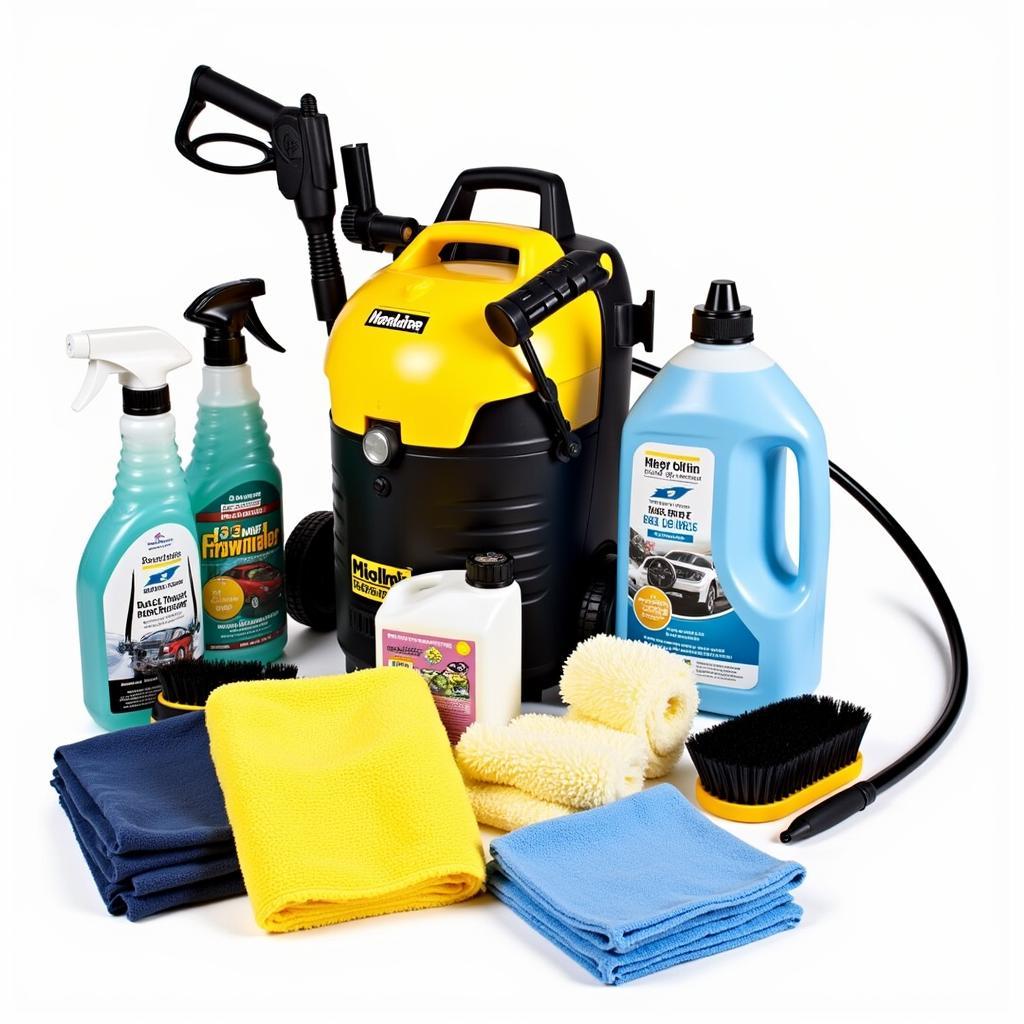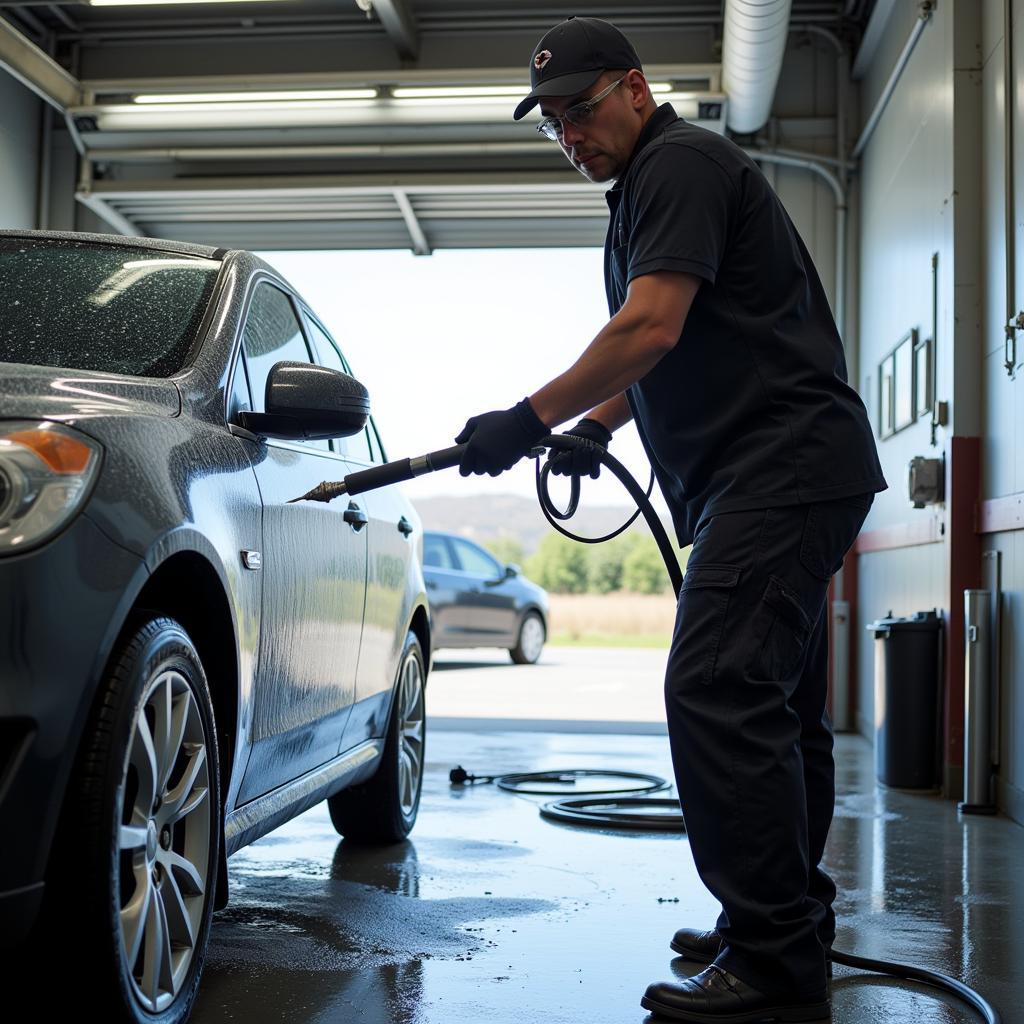A pressure washer can be a valuable tool for car detailing, but is it absolutely necessary? That’s a question many car enthusiasts ask, especially when starting their detailing journey. This article delves into the pros and cons of using a pressure washer for car detailing, helping you determine if it’s the right investment for your needs.
The Power of Pressure Washing in Car Detailing
Pressure washers offer several benefits when it comes to sprucing up your vehicle:
-
Efficient Cleaning: A pressure washer blasts away dirt, grime, and contaminants much faster than traditional washing methods, saving you time and effort.
-
Hard-to-Reach Areas: The powerful spray reaches nooks and crannies that are difficult to access with a sponge or cloth, ensuring a thorough clean.
-
Water Conservation: While it may seem counterintuitive, pressure washers actually use less water than a garden hose, promoting eco-friendly cleaning.
-
Versatility: Beyond car washing, pressure washers can be used for a range of tasks, from cleaning your driveway to patio furniture.
When a Pressure Washer Might Not Be Ideal
While pressure washers are undeniably powerful, they’re not always the perfect solution for every detailing task:
- Risk of Damage: Using excessive pressure or incorrect nozzle settings can strip paint, damage delicate trim, and force water into sensitive areas like electrical components.
- Cost Consideration: Pressure washers require an initial investment, and choosing the right model for your needs is crucial.
 Essential Car Detailing Supplies: Pressure Washer Alongside Other Tools
Essential Car Detailing Supplies: Pressure Washer Alongside Other Tools - Skill and Technique: Effective pressure washing involves using the right techniques and understanding the appropriate pressure levels for different surfaces.
Alternatives to Pressure Washing for Detailing
If you’re not ready to invest in a pressure washer, there are alternative methods for achieving a clean car:
- Traditional Hand Washing: A combination of car wash soap, microfiber mitts, and a hose can still deliver excellent results with proper technique.
- Waterless Wash Systems: These eco-friendly solutions utilize specialized sprays and microfiber cloths to lift dirt and grime without requiring rinsing.
Expert Insight: To Pressure Wash or Not?
“A pressure washer can be a fantastic addition to your detailing arsenal, but it’s not a magic wand,” says renowned detailing expert, Mark Williams. “Understanding how to use it properly is key. For beginners, I recommend starting with a lower-pressure model and practicing on less sensitive areas before tackling the entire car.”
Making the Decision: Do You Really Need a Pressure Washer?
Ultimately, the decision depends on your budget, detailing frequency, and comfort level. If you regularly detail multiple vehicles or enjoy tackling tough grime, a pressure washer can be a worthwhile investment. However, for occasional cleaning or those wary of potential damage, traditional methods or waterless systems offer viable alternatives.
 Professional Car Detailing: Utilizing a Pressure Washer for Efficient Cleaning
Professional Car Detailing: Utilizing a Pressure Washer for Efficient Cleaning
FAQs about Pressure Washers for Car Detailing
- What PSI is safe for car detailing? Generally, 1200-1900 PSI is suitable for car detailing. Always start lower and gradually increase pressure as needed.
- What type of nozzle should I use? A 40-degree nozzle offers a good balance of pressure and coverage for most car detailing tasks.
- Can I use a pressure washer on a wrapped car? Use caution with wrapped cars. Lower pressure and a wider nozzle are recommended. If unsure, consult a professional detailer.
Ready to Take Your Detailing to the Next Level?
Whether you’re a seasoned pro or just starting out, understanding the role of pressure washing in car detailing can significantly impact your results. Remember, proper technique and choosing the right equipment are essential for achieving a showroom-worthy shine without compromising your car’s finish.
Looking for more car detailing tips and advice? Check out our guides on what to buy for detailing cars, how to detail cars in the winter, and how to detail a wrapped car. We’re here to help you achieve professional-grade results at home.

Leave a Reply